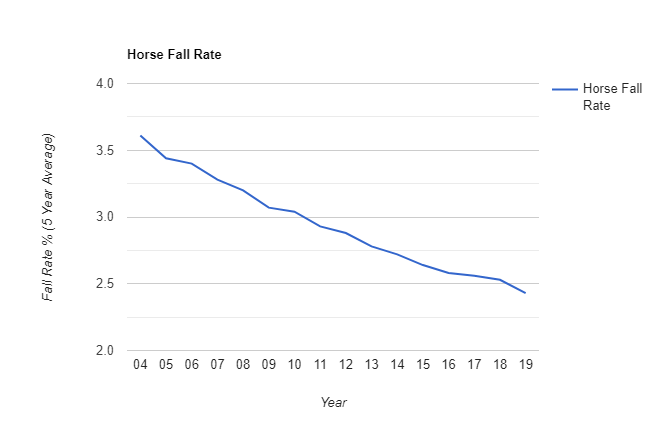
Leicester City vs Newcastle United Prediction Betting Tips & Preview
Date: 07/04/25Kick-off time: 20:00Venue: King Power StadiumThe Premier League match between Leicester City and Newcastle United will take place on Monday at the King Power…
Picking a winner in a horse race isn’t always an easy task. Weather conditions, the horses form and other runners all play a part in which one crosses the line first and if a horse falls, it has no chance of winning.
Unfortunately, horses fall quite often and the likelihood of a particular horse falling is something which a lot of amateur bettors fail to focus on when selecting their bets.
In this article, we’ll be covering the following topics:
There are various types of horse races but the main are flat races and jumps races.
In flat races, there are no fences, hurdles or obstacles to be jumped. Therefore, there is a significantly lower chance of horses falling. It is possible but your selection falling in a flat race shouldn’t be a concern generally.
The main cause of horses falling is when going over jumps. If they don’t time their jump correctly and land in good form, they could end up falling along with their jockey.
Different races have different sizes jumps to be cleared. The bigger the obstacle, the harder they are to jump and therefore there is an increased chance that a horse will fall.
In hurdle races, the obstacles tend to be relatively small. Horses do fall in hurdle races but not as much as in other jumps races.
Chase races, sometimes known as Steeplechases, feature much larger obstacles to be jumped and so there is an increased chance of horses falling or unseating their rider.
The table below shows the rate of fallers for runners from 2004 to 2019.
| Year | Number of Runners | % of Fallers (5 Year Av.) |
|---|---|---|
| 2004 | 34,052 | 3.61% |
| 2005 | 34.620 | 3.44% |
| 2006 | 35,409 | 3.40% |
| 2007 | 33,690 | 3.28% |
| 2008 | 36,077 | 3.20% |
| 2009 | 34,072 | 3.07% |
| 2010 | 31,251 | 3.04% |
| 2011 | 34,839 | 2.93% |
| 2012 | 31,629 | 2.88% |
| 2013 | 33,342 | 2.78% |
| 2014 | 31,263 | 2.72% |
| 2015 | 31,660 | 2.64% |
| 2016 | 32,067 | 2.58% |
| 2017 | 32,011 | 2.56% |
| 2018 | 32,420 | 2.53% |
| 2019 | 31,423 | 2.43% |

As you can see, the fall rates in British jump races have declined over the years. In fact, there has been a decline of 33% in fallers over the past 20 years!
The main reason there has been a decline in horses falling in races is due to the efforts to make hurdles, fences and racecourses safer for the jockeys and the horses.
For example, in 2012, around 30 new measures were implemented for the Grand National to make it safer. Some of these measures included:
Newly designed paddled hurdles were also introduced in 2014 and installed at 10 racecourses. These new hurdles have been proven to reduce the faller rate which declined 15% in 2017 from the average faller rate over birch hurdles.
As mentioned above, the number of horses which fall in a race depends on a number of factors such as the course, the conditions, the jockey and the difficultly of the jumps.
The Grand National takes place every year in April and is run over a course distance of 4 miles and 2 1/2 furlongs at Aintree Racecourse. Because the course is so long along with the fact there are 40 runners and 30 fences to be jumped, many horses fall. In fact, the most horses to ever finish a single Grand National was 23 out of 40 in 1984 and the fewest was just 2 in 1928!
Taking a look at another popular horse racing meeting, the Cheltenham Festival, there are 28 races which take place over the four days. 13 of the races are chases, 13 are hurdle races and there is 1 flat, or bumper race.
In 2019, 498 horses competed across the 28 races and there were just 20 falls which is just over 4%. Also, there were 8 fallers in The National Hunt Chase which is an event for amateur jockeys which may have had an effect on the number of fallers.
To summarise, some factors which can affect the likelihood of horses falling are:
Our racing tipsters take all of these factors into consideration when providing their Grand National tips each year.
Some online bookmakers offer customers a refund if your horse falls during the race. This also sometimes applies to instances when the horse unseats their rider.
So, are these offers worth it?
Sometimes they will be. On average, horses don’t fall that often. However, if you believe the conditions are poor in a testing jumps race and a bookmaker is offering refunds if your horse falls, they may be worth considering. For example, if a bookmaker was offering a refund on falling horses in the Grand National, this would be an excellent offer as no more than 57.5% of horses competing have ever completed the race and in 1928, just 5% of the horses finished!
Some bookies that occasionally run this offer on selected jumps races are Coral and Ladbrokes.
